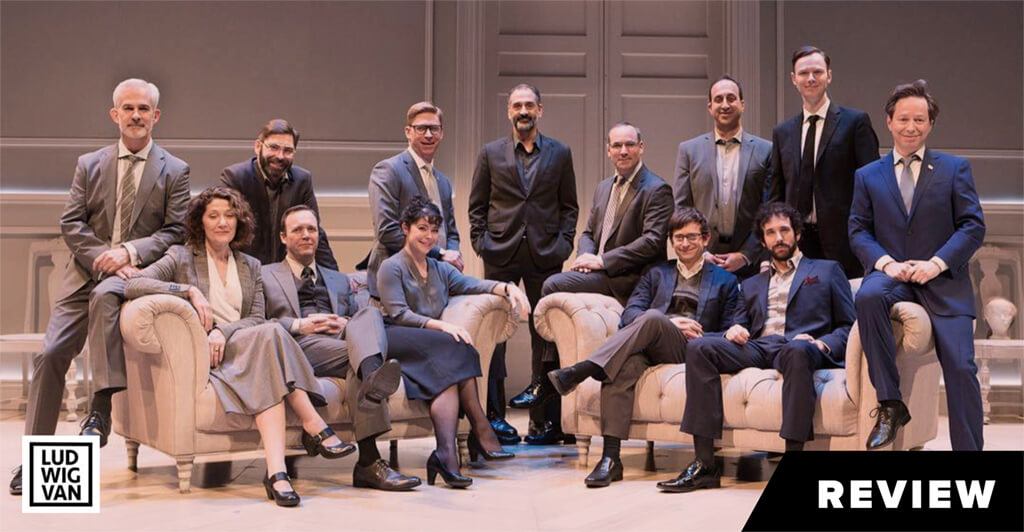
Off-Mirvish & Studio 180/ Oslo by J.T. Rogers, directed by Joel Greenberg, CAA Theatre, Feb. 9 to Mar. 3, 2019. Tickets available at TicketKing: 416-872-1212 or www.mirvish.com.
American playwright J.T. Rogers’ Tony Award-winning Oslo is an impressive work of theatre. Rogers admits in his program notes that he likes to pit very human characters against the background of the epic sweep of history — and nothing is more epic than the 1993 Oslo Peace Accords. In that euphoric document, Israel recognized the Palestinian Liberation Organization as the official voice of the Palestinian people, and the PLO recognized the legitimacy of the state of Israel. The Oslo Accords won the 1994 Nobel Peace Prize for Yasser Arafat, Yitzhak Rabin and Shimon Peres.
Beneath this history, however, lies the fascinating and almost unbelievable story of the Norwegian couple who spearheaded this peace process, and who are the central characters of Rogers’ play. Academic Terje Rød-Larsen (Blair Williams) ran a think tank and his wife Mona Juul (Marla McLean) was an official with the foreign ministry. While on a visit to Gaza, they witnessed a face-off between a young Israeli soldier and a Palestinian teenager, and this was their epiphany. They saw these two boys as different sides of the same coin and were determined to bring peace between them. Thus started the road to the Oslo Peace Accords. Even more incredible is that Rogers heard the story first hand from Larsen himself when the latter was a special envoy to the Middle East at the United Nations.
The play is not dry history, however. Rather, as Rogers traces the various machinations of how Larsen and Juul got the PLO and Israel to start the secret talks, and the Norwegian government to come on board, he presents an utterly fascinating array of characters portrayed by an outstanding group of actors. The PLO is represented by Ahmed Qurie (Sanjay Talwar) and Hassan Asfour (Omar Alex Khan); the Israelis by Yair Hirschfeld (Amitai Kedar), Ron Pundak (Jordan Pettle) and later, Uri Savir (Jonas Chernick) and Joel Singer (Alex Poch-Goldin). Yossi Beilin (Mark McGrinder), Israeli deputy foreign minister, played a key role at jump-starting the process. Various Norwegians are played by Patrick Galligan, Sarah Orenstein, Geoffrey Pounsett and Anders Yates.
As a mark of how engrossing the play is, even though we know the ending — that the Accords will be signed — we still live through the tension of the rollercoaster ride of the negotiations. Larsen’s radical idea was to throw out the conventional format of bringing parties in conflict together in the public eye. He saw the two sides not just talking in meetings, but sharing meals together and socializing in the evenings — all in isolation and in secret. The breaking down of barriers, political and personal, accompanied by both intense anger and laugh-out-loud humour, is one of the delights of the play.
Oslo is such a heady and dense mix of words and ideas, that the production itself needs to be uncluttered. Director Joel Greenberg has smartly opted for straight-forward dramatic action. The stage movement is uncomplicated and direct. Similarly, designer Ken Mackenzie’s simple and spare set sports sofas, chairs and tables on wheels that the cast can easily move into position when needed. Cameron Davis’ to-the-point projections, Kimberly Purtell’s subtle lighting and Thomas Ryder Payne’s unobtrusive soundscape carry on the neat and tidy theatrical values.
Rogers has put a lot of characters on stage, and it is to the credit of Greenberg and his cast that they all come across as individuals. The audience gets to know them, which is the goal of any playwright. At the core, Williams’ optimistic Larsen, and McLean’s pragmatic Juul are the glue that holds this disparate group of people together. Bitter enemies find compromise, and peace is a real possibility.
Sadly, we know that this is not how the scenario ultimately played out, but Rogers does give us at least a shining moment of hope, and in today’s troubled world, that is not a bad thing.
LUDWIG VAN TORONTO
Want more updates on Toronto-centric classical music news and reviews? Follow us on Facebook or Twitter for all the latest.
- INTERVIEW | Actor Diego Matamoros Takes On Icon Walt Disney In Soulpepper Production Of Hnath Play - April 16, 2024
- SCRUTINY | Opera In Concert Shine A Light On Verdi’s Seldom Heard La Battaglia Di Legnano - April 9, 2024
- SCRUTINY | Lepage & Côté’s Hamlet Dazzles With Dance And Stagecraft Without Saying Anything New - April 5, 2024



